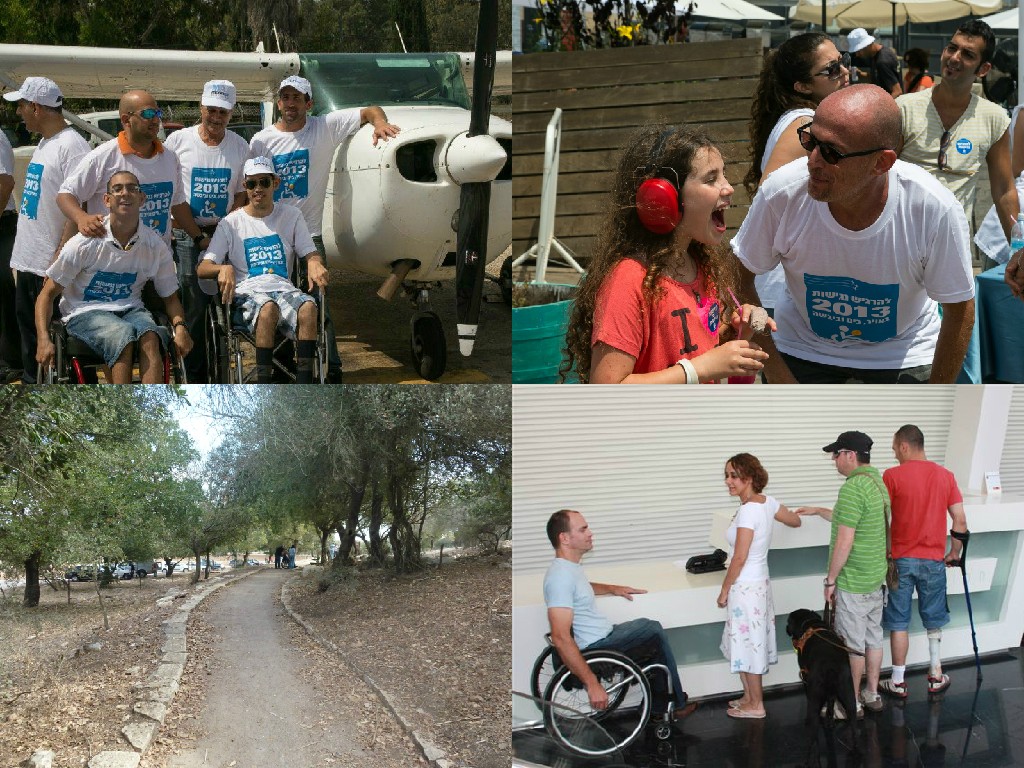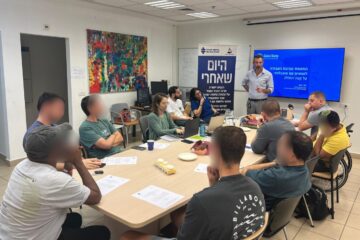Today is Israel’s Remembrance Day for fallen IDF soldiers and those murdered in terrorist attacks. As we remember and honor the memories of those who made the ultimate sacrifice for the State of Israel, we must also be cognizant of those injured in the line of duty, people whose lives were altered in an instant.
Yuval Wagner, an IDF Air Force pilot, was injured in a helicopter accident. Today, Yuval heads Access Israel, one of the leading organizations pushing for full inclusion in Israel. Here’s his story:
My father Danny was an IDF veteran who was wheelchair-bound. Throughout my childhood, I helped my father get around because Israel was not accessible to people with disabilities. I was brought up on love of country and civil service, was accepted to become a pilot and in 1986, I officially became a fighter pilot of attack helicopters. It was my childhood dream come true: my father encountered accessibility constraints on the ground, while I was able to touch the sky, fly over Israel and serve the country as a pilot in the Israeli Air Force.
On March 18, 1987, a beautiful, sunny spring day, I set out with a Cobra assault Squadron. I sat at the front of the helicopter and behind me was the squadron commander, Lieutenant Colonel Zion Bar-Or. The planned flight path was from the Palmachim base, over Jerusalem, the Jordan Valley and north of the Sea of Galilee and the Golan Heights.
Suddenly, a little south of Beit She’an, on the border between Jordan and Israel, at an altitude of 100 meters and a speed of 180 kilometers per hour, the helicopter began to shake uncontrollably. The helicopter become unmanageable, rolled to the left and crashed to the ground among the orchards of a Kibbutz. Zion Bar-Or was killed instantly. Miraculously, I remained alive but was left paralyzed from the neck down.
For the first time in Israel’s history, a father and son were both IDF veterans with a disability, bound to wheelchairs, with one difference: My injuries were more serious. Because I was paralyzed from the neck down, I required assistance and support 24 hours a day. For nine months I had to learn everything again: to eat, dress, bathe, write and move around in a wheelchair. The team that helped me return to “normal life” was the same rehabilitation unit at Tel Hashomer Hospital that helped my father in 1957.
After my rehab, the Air Force chose not to release me but instead asked me to change professions and become a programmer. On my first day out of rehab, I visited my new unit – the operational programming unit at Palmachim air force base. There I saw my friends continue to touch the sky, flying missions to protect Israel while I learned in the Mamram course, studying software. I initiated, developed and ran many projects in the army, while studying for my bachelor’s degree in business administration and later an MBA from Tel Aviv University. In September 2014, after 31 years of service in the Air Force, I was released with the rank of Lieutenant Colonel.

Access Israel, is dedicated to providing full accessibility in Israel.
In 2006, I married Yael and together we have raised three children: Tommy, who finished her army service last summer; Sean, who enlisted in the Air Force combat support unit 669; and Zoe, who is currently a high school senior. I have tried to provide my children with a better parenting experience than what I experienced as a child with my father wheelchair-bound. However, I discovered that the accessibility problems my father experienced in Israel remained unchanged. The same obstacles which prevent a normal life prevented me from going to the beach, work, a movie and more. I understood that this intolerable situation must end in order to prevent people with disabilities in Israel from feeling that they do not belong in society.
In 1998, I wrote then-President Ezer Weizman. I described to him accessibility problems in Israel and asked him to work to promote awareness of accessibility for all citizens in Israel. Two days later, the President himself called me and he “ordered” me to form an organization that will promote full accessibility in Israeli society. After receiving permission from the army to deal with this issue in addition to my other duties, Access Israel was launched in June 1999 at the President’s residence.
More than 15 years have passed since that phone call. Since that day, my life has been divided into three: family, work in the army and the accessibility revolution in Israel. However, I never expected that my main focus would be accessibility. Since June 1999, I have worked to promote accessibility in Israel in every possible way- strictly on a volunteer basis.
I learned that the story of my life is the story of 1.6 million people with disabilities living in Israel. Among those are people with physical disabilities, cognitive disabilities and mental health disabilities. It includes children and the elderly, IDF veterans with disabilities and victims of terror, people injured in work accidents and those who become disabled due to illness. For every one of them, accessibility is critical so that they can lead a normal life. Accessibility is required so they can be like every other citizen: go to school, join the army, learn in university, work and travel.
Today is Memorial Day in Israel followed immediately by Independence Day. Memorial Day ceremonies must be accessible for wounded IDF veterans who wish to mourn their comrades. Memorial Day ceremonies must also be accessible for bereaved family members who have a disability. Due to the work of Access Israel, military cemeteries and all ceremonies today and tomorrow are accessible.
I am proud of the many achievements of Access Israel: raising awareness and changing attitudes, accessibility legislation, election ballot accessibility, building and park accessibility, website accessibility and activities which significantly improve the quality of life for people with disabilities. But our work is not finished.
In the United States, which is considered a leader in many areas, the accessibility revolution has been going on for decades. I started almost alone in Israel and in 15 years have seen dramatic changes. The difference between the lack of accessibility my father experienced and what I experience today is nothing short of revolutionary.







